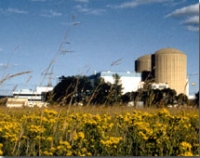Xcel Energy, owner of the Prairie Island nuclear power plant, has made a last minute submission advising against uprating the plant as it has realised a new fuel allows them to push their operating cycle out from 18 to 24 months.
 |
| Prairie Island (Image: Xcel) |
Xcel made its case in a letter to the Minnesota Public Utilities Commission, which is set to discuss tomorrow whether or not to press ahead with the uprate.
Key to Xcel’s argument is that the longer operating cycles will eliminate the need for two refuelling outages at each unit over their remaining lifetime. This will save the company some $75 million, and reduces the expected financial return on the uprate from $50 million, as estimated in March, to only $10 million. A $10 million return "is not a meaningful difference" according to the company, especially in the light of risks and uncertainties attached to the project.
Two new potential issues were identified during the most recent assessment. The first of these is that the Public Utilities Commission has pushed back its date for carbon assessments from 2012 to 2017 - eroding this financial benefit. The second is that the company has become increasingly concerned about the amount of time the Nuclear Regulatory Commission (NRC) will need to assess the application.
"Based on these considerations we conclude that the risks of the project outweigh the expected benefits, and customers would be better off if this project did not proceed."
Xcel Energy
NRC resources have been stretched due to the ongoing assessment of the Fukushima Daiichi nuclear accident, and commission staff have counselled that applications of all sorts may take longer to process. Xcel’s experience from uprating its Monticello plant taught them that licensing delays can occur if unique issues are identified. They note that a delay of even one cycle in implementing the uprate would be enough to entirely eliminate the expected financial return of the project.
Prairie Island consists of two pressurized water reactors. These were partly uprated in 2010 as a part of a program that was supposed to add 164 MWe to the plant. Currently unit 1 is rated at 560 MWe while unit 2 is 554 MWe. In March this year, Xcel made the recommendation to proceed with a 135 MWe uprate, but even then the company was worried about regulatory delay.
Xcel is confident that the uprate is unnecessary for meeting increasing electricity forecasts for the region. New resources will be needed by about 2017 with an acquisition process beginning in 2013. The company described the decision to recommend against proceeding with the uprate as a 'close call' and noted that they stood ready to proceed with the uprate if the Public Utilities Commission backed that decision.
Researched and writtenby World Nuclear News














